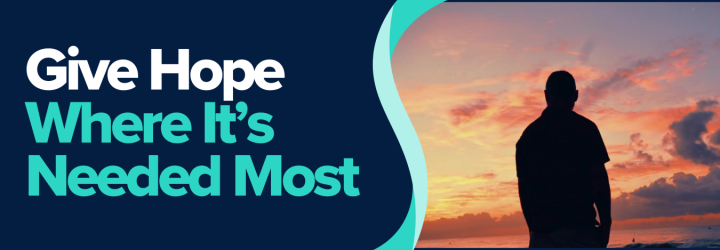
How To Help a Loved One Who Relapses
Demi Lovato's openness about her 2018 overdose-related hospitalization, which she discussed on the Ellen Degeneres Show, has helped to shatter stigma and educate the public about the chronic nature of addiction. But unfortunately, there's still a lot of misinformation out there when it comes to the best way to help a loved one through an experience like Demi's.
Let's say there's someone in your life who you thought was making great progress toward addiction recovery. But then, they suddenly experience a recurrence of substance use disorder symptoms—a situation commonly known as relapse.
What to do? Don’t panic. There’s no need to cut that person off with “tough love,” or to max out your credit card shipping them to a destination rehab.
We talked to medical experts, plus people with lived experience of recovery, to get the facts about this kind of situation and how to support someone through it.
First, understand what's going on medically.
What happens when someone starts using substances after a period of abstinence?
Simply put - after you stop using, your body changes. It can no longer cope with the amount of drug you used to take. That makes it easier to overdose if you start using again after a period of time. And unfortunately, once you overdose once, research shows it's more likely to happen again.
It has to do with tolerance, says Dr. Shawn Ryan, founder of BrightView Health and president of the Ohio chapter of the American Society of Addiction Medicine (ASAM). When a person stops using a given drug, “their tolerance drops and puts them at risk for more medical consequences if they relapse.” For example, “if a patient has stayed abstinent from opioids for a while (whether using medications for treatment or not), their tolerance for fast-acting opioids such as heroin substantially declines; this is why patients are at such high risk of overdose if they go back to using their old dosages.”
A symptom recurrence can be a part of addiction, and addiction is a medical illness.
“Once an individual becomes addicted, the brain rewires,” says Nikki Litvak, MA, LPCC-S, LICDC, the Associate Director of Counseling at BrightView. “Relapse is not a choice, but a potential part of the disorder.”
It’s really not about willpower.
“Most people wouldn't yell at a loved one who forgot their inhaler at home, and then had an allergic reaction as a result of their medical condition,” Litvak continued. So we shouldn’t react with anger or disappointment when someone we’re close to is coping with addiction.
Symptoms can flare up during treatment for many types of chronic illnesses, like diabetes or hypertension. Addiction is no exception. It doesn’t mean someone has failed or didn’t try hard enough.
How to best support someone experiencing symptom recurrence
Be there to offer “empathy, empathy, empathy.”
Laura Silverman, a Shatterproof ambassador and founder of the Sobriety Collective, has been in recovery for more than 12 years. Her advice for supporting a loved one through this experience? “Empathy, empathy, empathy. Remove shame, don’t blame, and show love.”
It shouldn’t be that strange of a concept. “Do we shame someone with a recurrence of cancer?” Silverman asks. “No. Then why do we shame people with a recurrence of substance use?”
Litvak agrees with this approach. “There is no shame in connection and being a person,” she says. “We all need help sometimes and the best help anyone can get is genuine, compassionate, and trustworthy connection from another person. The best thing to do is love them, support them, encourage treatment, and be understanding of their struggle.”
Remember to take care of yourself, too.
“Love can come with boundaries,” Silverman also says. “Caregivers or loved ones can show the person of concern that they care, that they’re there to support and love them—while still maintaining healthy boundaries and their own self-care.”
Be prepared for an emergency.
If your loved one is addicted to opioids, be sure to keep a naloxone kit on-hand at all times. This safe, FDA-approved, easy-to-use medication can reverse an opioid overdose in minutes. Naloxone is now available in pharmacies in most states without a prescription. Learn about how naloxone works, how you can get it, and how to use it.
Encourage high-quality treatment.
There’s so much misinformation surrounding what’s best to treat addiction. 12 steps? In-patient rehab? What about medications?
Two things matter most: Local resources and an individualized plan.
“The most effective treatment for someone suffering from substance use disorder is based on the individual's needs. Each person suffering from substance use disorder should recognize their priorities which may include religious affiliation, insurance costs (or lack thereof), medication, privacy, and many other factors,” says Litvak. “You should begin looking for treatment within your insurance provider, primary care, and local recovery support systems.”
ASAM’s physician locator and the American Board of Preventative Medicine (ABPM)’s search tool are helpful places to find medical professionals in your area who are certified to provide addiction treatment. Findtreatment.gov is another useful resource.
Educate yourself on what good treatment looks like.
To know what to look for in legitimate addiction treatment, read up on Shatterproof’s National Principles of Care. They’re a set of eight core concepts for addiction treatment, crafted by experts and backed by decades of research. These Principles remove some of that confusion from the addiction treatment process, and show the path toward sustained recovery for patients dealing with addiction.



